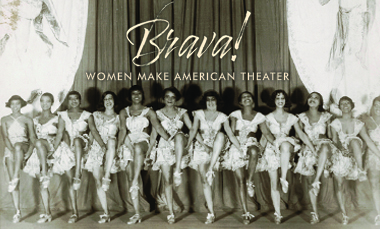Brava! Women Make American Theater

Read & download labels from the show
Speaker Series: Women, Theater, Archives: Conversations
Introduction
Brava! Women Make American Theater showcases, through archival materials, the ways in which women in the United States engaged in the production and reception of text-based stage performance over its long history. Far from offering a comprehensive account of women in theatrical enterprises, Brava! highlights how stage performance often mirrored, but also frequently challenged and changed, understandings of women’s roles and of women’s rights in larger U.S. society. Drawing principally on materials in the Yale Collection of American Literature and the James Weldon Johnson Memorial Collection of African American Arts and Letters, the exhibit explores how theater served as a site of women’s entry into public audiences for the arts in the 19th century, an entrée into the arts as professions in the 20th century, and a locus of calls for diversity in the arts in the 21st century.
Brava! captures intriguing moments of intersection between U.S. women’s and theater history: the sensation that was Uncle Tom’s Cabin, made so by women on the stage and in the audience; the leadership of early Black musical performers like the Hyers Sisters and Aida Overton Walker; the changing mores around female bodies conducted through the appearance of legs both on- and off-stage; and questions raised about gender identity itself both on- and off-stage. Women theater artists like Margaret Webster were persecuted equally with men by the Red Scare of the postwar period. They experimented with form, style, and venues for theatrical performance throughout the twentieth century. Numerous figures featured in the exhibit received and later led theater education in bourgeoning university programs, including Fanny McConnell at Iowa and Hallie Flanagan at Grinnell; Flanagan would eventually found the drama department at Vassar. Both Maurine Dallas Watkins and Theresa Helburn studied with George Pierce Baker at Harvard before he became one of the founding faculty members of the Yale Drama Department; Shirley Graham studied at both Oberlin and Yale. These women participated in community theater organizations over generations, such as the early Provincetown Players, the Yiddish workers theater troupe Artef, and Negro People’s Theaters in New York and Chicago. It should come as no surprise, and yet needs to be said, that women were behind innovations in musical theater, choreography, experimental writing, design, acting, theater management, and more.
Brava! also highlights fascinating legacies and mentorships among women: actor Katharine Cornell mentored Maureen Stapleton. Eva Le Gallienne mentored and directed a young Uta Hagen. Both Le Gallienne and Gertrude Stein saw Sarah Bernhardt perform, and both cited it as a formative experience. Hallie Flanagan mentored Shirley Graham when she chose her to lead the Negro Unit of the Federal Theatre Project in Chicago. Paula Vogel taught Sarah Ruhl, Quiara Alegría Hudes, and Lynn Nottage.
The above catalogues may suggest something about the difficulty of telling a single story about women and U.S. stages. Brava! embraces a multiplicity of stories, recognizing that for each of these individuals, what it meant to be a woman, what was at stake for women’s rights or for feminism, might be different. At the same time, we recognize that Brava! is incomplete as a story, and that its omissions are suggestive of gaps–in recognition, in Beinecke’s collections, and in the larger historical record as it currently stands–for women of color, trans women, and others.
Archivists sometimes describe the life of the materials they steward as having a “second life” in becoming sources for research. It is our hope that this exhibit might return many of these figures to a second life, particularly amidst a period in which so many theaters have gone dark or struggled to remain open. In a preface to her posthumously published autobiography, appropriately titled “Curtain Raiser,” an ailing Theresa Helburn remarked on the pleasure of reflecting on her career, suggesting that to remember was almost like the experience of theater-going itself: “Best of all, I’ve felt again the ever recurring thrill, the heart-rousing moment, when the house lights go down and the footlights come up.”
Brava! invites you to remember.
-Melissa Barton
Curator, Drama and Prose, Yale Collection of American Literature and James Weldon Johnson Memorial Collection of African American Arts and Letters
Credits
Curator: Melissa Barton
Research assistants: Sophie Greenspan, Henriëtte Rietveld, Elizabeth Wiet
Guest contributors: Susan Brady, Isaac Scobey-Thal ’20, Elizabeth Wiet Ph.D. ’22
Exhibit production and project management: Kerri Sancomb, Megan Czekaj, Sarah Davis
Conservation: Ansley Joe, Karen Jutzi, Marie-France Lemay, Frances Osugi, Paula Zyats
Design: Megan Mangum, Words that Work
Copy editing: Christa Sammons
Special Thanks: Rebecca Adelsheim, Tom Bolze, Susan Brady, Ruth Carruth, Julie Cohen, David Driscoll, Sophie Greenspan, Bob Halloran, Lily Haje, Colette Hardman-Peavy, Rebecca Hatcher, Werner Haun, Nancy Kuhl, Lindsay King, Daniel J. Linke, Matthew Mason, George Miles, Meredith Miller, Michael Morand, John Monahan, Lucy Mulroney, Eve Neiger, Doug Reside, Henriëtte Rietveld, Tom Sellar, Catherine Sheehy, Ashley Thomas, Tim Young, Faith Zamble, Beinecke Access Services
This exhibit was originally planned to honor women at Yale for the 50th anniversary of coeducation in Yale College and the 150th anniversary of coeducation at the university.
Selected Bibliography
Barlow, Judith E., ed. Plays by American Women, 1900-1930. New York: Applause Theatre Book Publishers, 1985.
—-. Plays by American Women, 1930-1960. New York: Applause Books, 1994.
Black, Cheryl. Women of Provincetown, 1915-1922. Tuscaloosa: University of Alabama Press, 2002.
Brooks, Daphne. Bodies in Dissent: Spectacular Performances of Race and Freedom, 1850-1910. Durham, NC: Duke University Press, 2006.
Dudden, Faye E. Women in the American Theatre: Actresses and Audiences, 1790-1870. New Haven: Yale University Press, 1994.
Owen, Bobbi, ed. Late and Great: American Designers 1960-2010. New York: United States Institute for Theatre Technology, Inc., 2010.
Robinson, Marc. The American Play: 1787-2000. New Haven: Yale University Press, 2009.
Senelick, Laurence. The Changing Room: Sex, Drag, and Theatre. London and New York: Routledge, 2000.